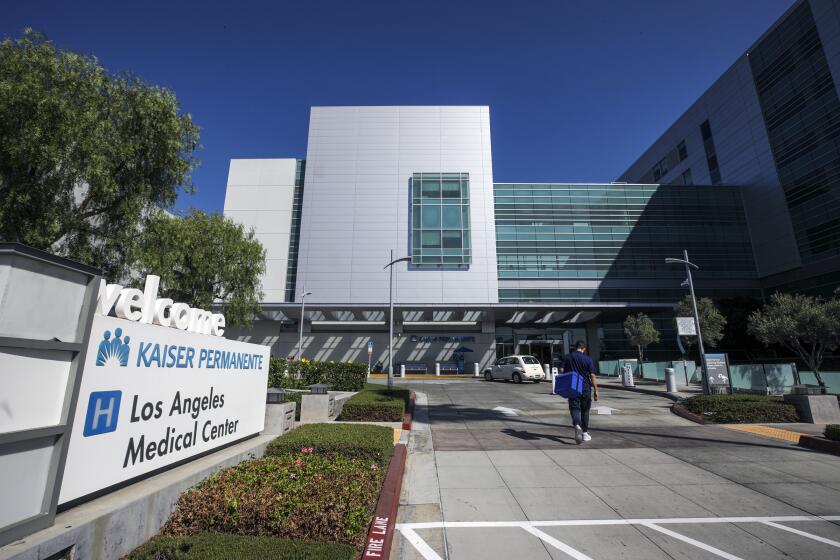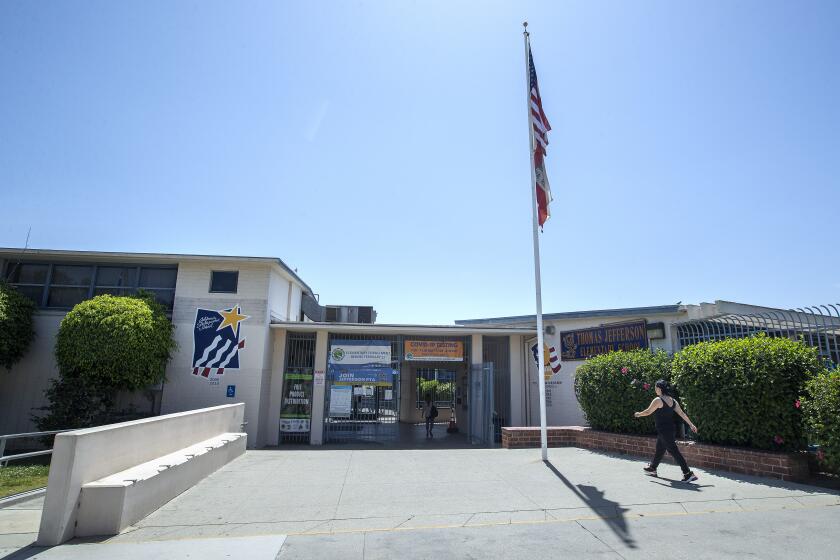Maywood the latest subject of corruption investigations
Maywood Councilman Felipe Aguirre sees his small working-class city as “the Santa Monica of the Southeast” — a place built on activism, a healthy distrust of the establishment and compassion for the less fortunate.
FOR THE RECORD:
Maywood lead program: An Aug. 17 article in Section A about business deals under investigation in Maywood referred to a $360,000 lead-abatement program that a former city manager had canceled, saying the cost was excessive given that no lead was removed from homes. The article should have made it clear that the contract with Union de Vecinos was to provide public education, not to remove lead from properties. —
But these days, Maywood is gaining a decidedly less romantic image.
Earlier this year, officials announced that they were firing the city workforce and outsourcing most municipal functions to the neighboring city of Bell. Then, Bell’s government imploded in a scandal over eye-popping salaries paid to the city manager and other senior officials.
Now, Maywood is under scrutiny from the FBI and other law enforcement agencies over two city deals with ties to Aguirre and his allies. Sources told The Times that investigators are also looking into deals apparently unrelated to Aguirre.
The Maywood probes are the latest in a string of public corruption investigations in southeast Los Angeles County that have resulted in indictments in South Gate, Lynwood and Vernon in recent years. The California attorney general’s office and the L.A. County district attorney are now investigating Bell as well.
It’s unclear exactly how many transactions the FBI is examining in Maywood. Several sources with knowledge of the probe said one of the deals involves a $95,000 federal grant that Aguirre and a business partner received from the city in 2007. They used it to refurbish the facade of a property where the business — a community advocacy group — is located. Aguirre’s business received the grant despite concerns from the city’s planning director over a possible conflict of interest.
David Mango, the planning director, said he immediately called the city attorney’s office, which raised no objections.
In an interview, Aguirre said he regrets taking the money. He said he had concerns at the time but was never told he was ineligible for the money.
“It’s there, it happened, and I can’t take it back,” he said. “Do I wish it happened? No. Should I have talked to someone else and gotten better advice? Probably. But it happened and I can’t take it back and I can’t say it didn’t happen.”
Aguirre’s election in 2005 marked a shift in Maywood from a relatively conservative Latino-majority council to a more liberal one dominated by social activists. The old council had been criticized by many Maywood residents for supporting police activity that included aggressive parking and traffic enforcement that allegedly targeted illegal immigrants. They were also criticized for maintaining cozy ties to a towing company that lavished some public officials with meals and tickets to sporting events in Las Vegas.
It didn’t take long for Aguirre and his allies to make their mark. The council declared Maywood a “sanctuary city,” making it a lightning rod in the debate about illegal immigration and provoking fierce debates among the city’s mostly Latino residents.
Over the next few years Aguirre and other council members, with the support of activist groups including Union de Vecinos, took on the Police Department, the Los Angeles Unified School District and a local water district.
“Our best defense, and our best situation, is the people being organized,” Aguirre said. “This is a city that basically tries to strengthen the roots of community participation.”
Outsiders noticed the increased public participation in Maywood — particularly in contrast to neighboring Bell. “Maywood is more volatile,” said Assemblyman Hector De La Torre (D-South Gate). “But in Bell, people mistook stability for democracy and participation.”
The question in Maywood is whether activism may have become a cover for improper spending.
In addition to investigating Aguirre’s $95,000 grant, law enforcement officials have asked questions about $360,000 paid to Union de Vecinos to run a lead abatement program. The officials familiar with the law enforcement inquiries spoke on condition of anonymity because they were not authorized to discuss the subject publicly.
Interviews and records reviewed by The Times show that the group did not remove lead from any homes, although it did perform lead tests and conduct public education campaigns.
Former Maywood City Manager Paul Phillips said he cancelled the contract in late 2009 because he didn’t think the city was getting its money’s worth and was concerned about the group’s ties to Aguirre and his allies.
“There were no efforts to do any remediation,” Phillips said. “I just thought the dollar amounts were excessive.”
Mango, the planning director, said he also had early concerns about Union de Vecinos. The group had not been submitting addresses of residences they had visited. The group told the city that confidentiality was needed to protect tenants from landlords. Aguirre said that after concerns were raised last year, the group began submitting addresses to the city attorney’s office.
Mango said he thought the group did a good job with outreach efforts and that the city’s agreement did not require actual lead abatement. But he said the group’s ability to account for government money was inadequate early on: “Some of their early billings would not have passed muster if they were audited. They were pretty flimsy.”
Aguirre said he recommended Union de Vecinos for the lead program because he considered them an “honest and transparent group” that had done a lot of work in the community.
Co-founder Elizabeth Blaney said Union de Vecinos had done lead outreach and education before. When she presented the proposal to Mango and council members on the redevelopment board, none of them voted against the contract or voiced opposition, she said.
hector.becerra@latimes.com
More to Read
Start your day right
Sign up for Essential California for news, features and recommendations from the L.A. Times and beyond in your inbox six days a week.
You may occasionally receive promotional content from the Los Angeles Times.







